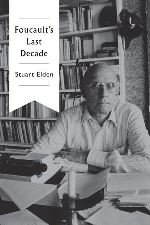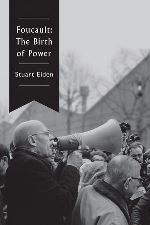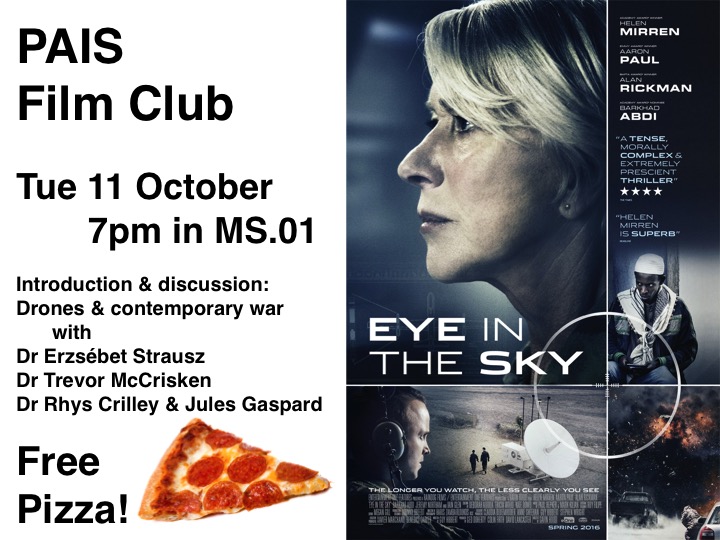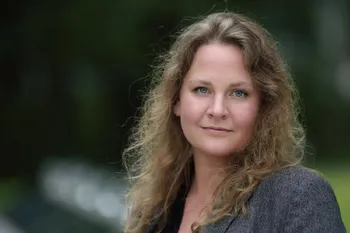Other News
Stuart Elden interviews on Foucault's Last Decade

 Stuart Elden has been interviewed about his recent book Foucault's Last Decade for the New Books in Critical Theory series podcast– download or stream.
Stuart Elden has been interviewed about his recent book Foucault's Last Decade for the New Books in Critical Theory series podcast– download or stream.
There is also an interview about the book at Critical Theory and a piece about its writing at Berfrois. A discussion with Peter Gratton, Eduardo Mendieta and Dianna Taylor will appear in Symposium later this year, and Stuart will also be interviewed for the Bulgarian journal KX - Critique and Humanism.
A second linked book by Stuart, Foucault: The Birth of Power, will be published by Polity Press in early 2017.
PAIS Film Club: Eye in the Sky
The PAIS Film Club gets underway on Tuesday 11th October at 7pm in MS.01.
We are screening 'Eye in the Sky', and there will be a discussion of the film with Dr Erzsébet Strausz, Dr Trevor McCrisken, Dr Rhys Crilley & Jules Gaspard.
There will also be free pizza for all audience members, and of course all students and staff are welcome.

Interview with PAIS PhD: How to secure reputation by designing behavioral risk strategies?
PAIS PhD Alexandra Dobra's paper was acceepted at IDRC Davos 2016 (Davos, Switzerland), the world's leading conference on risk management, which was organised under the patronage of the European Commission Joint Research Centre, OECD, Science Council of Japan, UNCCD, UNESCO, UNEP and UNITAR.
Her interview "How to secure reputation by designing behavioral risk strategies?" can be viewed below:
PAIS Seminar Series: Barry Buzan talk, 5th October
Professor Barry Buzan – London School of Economics
Title: Twentieth Century Benchmark Dates in International Relations: The Three World Wars in Perspective
This paper builds on earlier work by Buzan and Lawson on how to think about benchmark dates in International Relations (IR). The Introduction summarises the analytical scheme from the earlier work and explains how this paper extends the analysis from suggestions made, but not developed, in the article. The second section uses the analytical scheme to look in more depth at the 20th century benchmarks centred around the three world wars (First, Second and Cold). It argues that by these criteria, the changes clustered around the Second World War look to be both deeper and more extensive than those clustered around either the First World War or the Cold War. The third section moves towards opening up a macro-historical perspective on the 20th century. It paves the way by considering how other IR benchmarks represent cluster of events occurring over decades or centuries. And it raises questions about how choices in relation to time and scale affect the construction of macro-historical perspectives. The fourth section chooses a two-century perspective centred on the revolutions of modernity as a way of evaluating the 20th century events. It first sketches out the main lines of this grand narrative, and then assesses the 20th century events within that framing. The Conclusions argue that a 20th century stretching from 1905 to 1989, or possibly 2008, can be seen not just as three world wars, but as an integrated process of working out first order solutions to the problems set up by the revolutions of modernity in the 19th century.
5 October, 2016
3-4.30pm
MS.04 (Zeeman Building)
The talk will be followed by a wine reception.
Alexandra Homolar Wins ISA Workshop Grant
 Dr Alexandra Homolar, ESRC Future Research Leaders Fellow and Associate Professor of International Security in PAIS, has won a prestigious Workshop Grant funded by the International Studies Association in collaboration with Professor Brent Steele from the University of Utah. Dr Homolar is the Research Lead for the Speaking International Security at Warwick (SISAW) Project, and is the Lead Organiser for the CSGR/SISAW Conference on Global Security and Diplomacy, to be held at the University of Warwick on 4-5 May 2017.
Dr Alexandra Homolar, ESRC Future Research Leaders Fellow and Associate Professor of International Security in PAIS, has won a prestigious Workshop Grant funded by the International Studies Association in collaboration with Professor Brent Steele from the University of Utah. Dr Homolar is the Research Lead for the Speaking International Security at Warwick (SISAW) Project, and is the Lead Organiser for the CSGR/SISAW Conference on Global Security and Diplomacy, to be held at the University of Warwick on 4-5 May 2017.
The ISA Workshop will be held on Tuesday February 21st at the Hilton Hotel Baltimore, USA, and will precede the start of the 2017 ISA Annual Convention. The Workshop is focused on the theme: ‘Fear, Trauma, and Belonging: The Everyday of Ontological Security in International Relations’. The event will bring together internationally-renowned scholars from twelve institutions across Europe, North America, and Australia, with the aim of developing a transformative analytical strategy that combines notions of ontological security and the everyday within a new conceptual framework through the presentation of original research that is based on a wide array of empirical reference points, including migration, diaspora, and border politics; militarized security rhetoric and cognition; the politics of home-coming; terrorism and resilience; trauma comedy; emotion, affect, and securitization; rhythmic security; the politics of the event.
Following the ISA Workshop, these research themes will be further explored at the CSGR/SISAW Conference at Warwick on 4-5 May 2017 (see: www.warwick.ac.uk/sisaw/conference).
Further information:
- Speaking International Security at Warwick: www.warwick.ac.uk/sisaw
- CSGR/SISAW Conference on Global Security and Diplomacy: www.warwick.ac.uk/sisaw/conference
- International Studies Association 2017 Annual Convention: www.isanet.org/Conferences/Baltimore-2017
